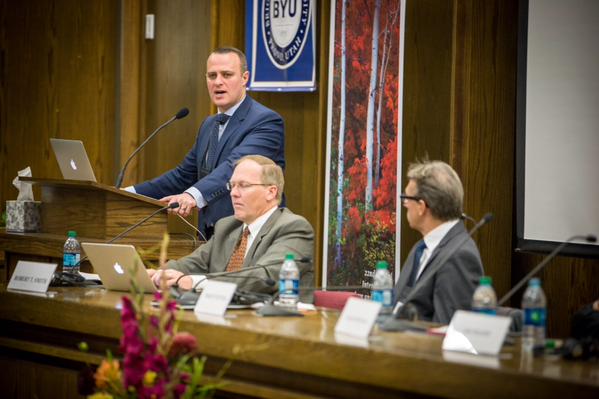Symposium 2015 First Plenary Session: Religious Freedom and Social Stability

Reported by Blythe Shupe
The first plenary session of the 22nd Annual International Law and Religion Symposium centered around the topic of Religious Freedom and Social Stability. Moderated by Robert Smith, Managing Director of the International Center for Law and Religion Studies, the panel featured Marco Ventura, Professor, University of Siena, Italy; Faizan Mustafa, Vice-Chancellor, NALSAR University of Law, India; and Tim Wilson, Australian Human Rights Commissioner.
Professor Marco Ventura of the University of Siena argued that “human agency is key to an appropriate articulation of religious freedom and social stability.” First, he addressed the redefinition of the interaction of law and religion as demonstrated by the United Nations International Day of Yoga and the European Union Guidelines for ‘the protection and promotion of freedom of religion or belief’. The first demonstrates the rise of a de-westernized global religion which blurs the line between spirituality, religious and non-religious elements and cultural values. The second attempts to address the growing concern to protect religion while recognizing the rise of the many who are not affiliated with a particular religion, thus the shift from the term ‘religious liberty’ to ‘freedom of religion or belief’.
Second, he argued that religious freedom and social stability are in jeopardy. There is a danger that the global civil society, while embracing the principles, may merely agree upon a shell of the two, or, on the contrary, become too caught up in individual freedoms and not search for a commonality.
To make his point that human agency is crucial, Professor Ventura quoted United Nations Special Rapporteur, Heiner Bielefeldt, “…human agency is inevitably involved in interpreting religious traditions, dogmas, laws or identities. Open-minded interpretations that encourage tolerance, empathy and solidarity across boundaries may exist alongside narrow-minded interpretations of the same religion, which lead to polarized worldviews and a militant rejection of people holding other persuasions.” We bear responsibility for the consequences of our interpretations. Thus, Professor Ventura said, “Instead of being used [as]a mantra condoning individuals and communities which do not discharge their duties, religious freedom and social stability should be the realm of responsible choice and action.”
Faizan Mustafa, Vice-Chancellor, NALSAR University of Law, spoke proudly of India as a country of many religions with a constitution that is one of the best in protecting religious freedom. He felt very confident that the tolerant majority community would take care of its minorities, although he did acknowledge some aggressions in his country towards minority religions that he found disturbing.
According to Professor Mustafa, India adopted secularism to manage irreconcilable tensions between religious groups with the goal to preserve and celebrate all religious identities, and to provide equality of religions. The government is not aligned with any religion. However, he did acknowledge that some state governments have created some laws that restrict conversion. He also addressed occurrences of hate speech but believes that those participating in such acts are a minority of the people, not the majority. His “great hope”, based upon the constitution and the majority of the Indian community, is that tolerance and religious freedom will prevail.
Tim Wilson, Australian Human Rights Commissioner, stated that while he considers himself irreligious, he sees religion as important and religious freedom as one of the most significant human rights values. However, religious freedom does not sit in isolation. Solely appealing to one human right will rarely win you an argument in Australian public opinion and victimhood based on faith is not an effective strategy.
While religion plays an important role in civil society by informing public morality, the law must treat and respect all equally. “When law is used as a tool to define basic liberties, inconsistent application feeds resentment. “ Such resentment contributes to radicalization. Resentment may also arise from the influence of religion upon law.
Ultimately, argued Mr. Wilson, people must be free to choose. Religion “can recognize the reality and use it as a basis for a broader compact for freedom for all or risk being cast aside as unreasonable.” Mr. Wilson went on to say that “Advancing religious freedom is linked to respecting and advancing the rights of others.” He also argued that preserving religious freedom has to come with accommodation for people to act within their conscience. In regards to LGBT marriage while at the same time protecting religious marriage, he believes that accommodation can be achieved through respect for the rights of all.